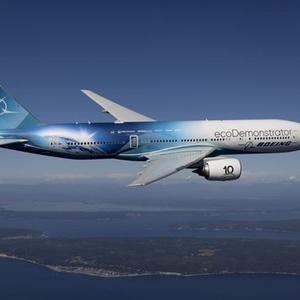Neste supplies SAF to Boeing

SOURCE: Boeing
February 20, 2023
BY Neste Corp.
Boeing has agreed to purchase Neste MY Sustainable Aviation Fuel supplied by EPIC Fuels, Signature Aviation and Avfuel to power its U.S. commercial operations through 2023. These fuel purchases more than double Boeing's SAF procurement from last year. Neste’s SAF will be blended with conventional jet fuel at a 30/70 ratio to produce 5.6 million gallons of blended SAF.
“As one of the top aircraft manufacturers in the world, Boeing is sending a clear message to the entire aviation industry through this purchase that SAF is a key solution to reduce greenhouse gas emissions from flying,” said Michael Sargeant, vice president Americas, renewable aviation at Neste. “We are proud to be a part of this collaboration along with our partners EPIC Fuels, Signature Aviation and Avfuel.”
Advertisement
Advertisement
EPIC Fuels, Signature and Avfuel will supply blended SAF for Boeing’s ecoDemonstrator program and the company’s fuel storage in Washington state and South Carolina. Additionally, EPIC Fuels and Signature will supply blended SAF for generating emissions reduction benefits for Boeing to allocate for company operations including Dreamlifter and executive flights, and commercial airplane deliveries. In 2021, Boeing committed to deliver its commercial airplanes capable and certified to fly on 100% SAF by 2030.
Sustainable Aviation Fuel
SAF is a next generation aviation fuel providing a more sustainable alternative to conventional, fossil based jet fuel. It is widely recognized as a key lever to achieve aviation’s emission reduction goals. Using Neste MY Sustainable Aviation Fuel™ reduces greenhouse gas emissions by up to 80 percent* over the fuel’s life cycle, compared to using conventional jet fuel. Neste’s SAF is made from sustainably sourced, 100 percent renewable waste and residue raw materials, such as used cooking oil and animal fat waste. SAF is certified for commercial use and can currently be blended up to 50 percent with traditional jet fuel without modifications to airplanes, engines or fueling infrastructure.
Advertisement
Advertisement
*) When used in neat form (i.e. unblended) and calculated with established life cycle assessment (LCA) methodologies, such as CORSIA methodology
Related Stories
Marathon Petroleum Corp. on Aug. 5 released second quarter financial results, reporting improved EBITDA for its renewable diesel segment. The company primarily attributed the improvement to increased utilization and higher margins.
Chevron Corp. on Aug. 1 confirmed the company started production at the Geismar renewable diesel plant in Louisiana during the second quarter after completing work to expand plant capacity from 7,000 to 22,000 barrels per day.
The public comment period on the U.S. EPA’s proposed rule to set 2026 and 2027 RFS RVOs and revise RFS regulations closed Aug. 8. Biofuel groups have largely expressed support for the proposal but also outlined several ways to improve the rulemaking.
In celebration of World Biodiesel Day, MOL Group on Aug. 8 announced SAF was successfully produced for the first time at INA’s Rijeka Refinery during a pilot project to process biocomponent. Renewable diesel was also produced.
Iowa farmers have a new market opportunity for their 2025 soybean crop. Landus is expanding its Clean Fuel Regulation initiative, made possible by recent policy changes expected to increase Canada's demand for liquid biofuel.
Upcoming Events










